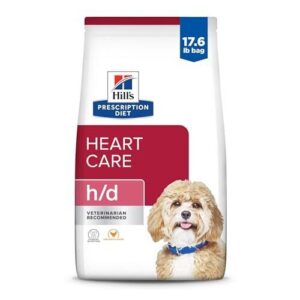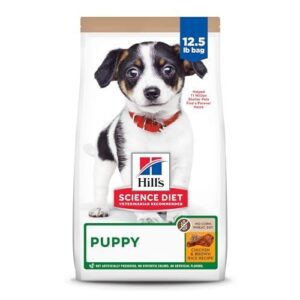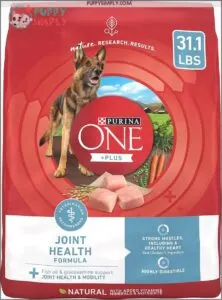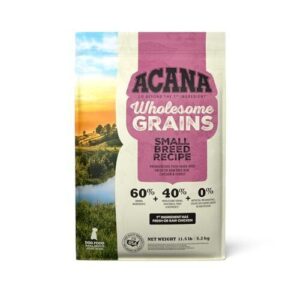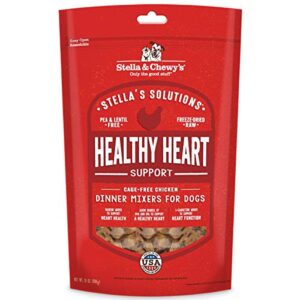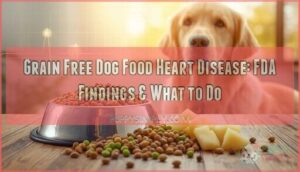This site is supported by our readers. We may earn a commission, at no cost to you, if you purchase through links.
When your dog receives a heart disease diagnosis, the ground shifts beneath your feet—but here’s something most owners don’t realize: nutrition becomes one of your most powerful therapeutic tools. The right dog food for heart disease doesn’t just fill your companion’s bowl; it directly influences fluid retention, inflammation levels, and cardiac muscle function in measurable ways.
Sodium content matters more than most premium brands acknowledge, omega-3 ratios can reduce dangerous arrhythmias, and certain grain-free formulas have been linked to a preventable form of heart failure. Your veterinarian will discuss medications, but the food you choose three times a day works alongside those prescriptions—or quietly undermines them.
Understanding which ingredients support cardiac function and which ones create additional strain helps you make decisions that extend both quality and quantity of life.
Table Of Contents
- Key Takeaways
- Top 5 Dog Foods for Heart Disease
- Key Nutritional Needs for Heart Health
- Choosing The Right Dog Food for Heart Disease
- Managing Canine Heart Disease With Diet
- Frequently Asked Questions (FAQs)
- What dog food is good for the heart?
- What can I give my dog to strengthen his heart?
- How can I slow down my dog’s heart failure?
- What is a natural remedy for congestive heart failure in dogs?
- How can diet affect my dogs heart health?
- What signs of heart disease should I watch for?
- Are there specific dog breeds prone to heart issues?
- How often should a heart-healthy diet be updated?
- What role do antioxidants play in heart health?
- Can heart disease in dogs be reversed with diet?
- Conclusion
Key Takeaways
- Sodium restriction to 0.1–0.3% dry matter becomes your first defense against fluid retention, with studies showing 20–30% less congestion when paired with medications—prescription formulas like Hill’s h/d cut sodium by roughly 48% compared to commercial options.
- Omega-3 fatty acids at 80–100 mg/kg daily deliver measurable cardiac benefits by reducing inflammation markers 20–25% and improving heart muscle contraction, while taurine and L-carnitine supplementation prevents deficiency-related cardiomyopathy in susceptible breeds.
- Grain-free diets high in legumes or potatoes carry documented DCM risks according to FDA investigations, with no cardiac advantage over quality grain-containing formulas that naturally provide better taurine bioavailability.
- Veterinary partnership transforms diet from guesswork into strategic therapy—60% of cases show improved outcomes with customized plans, requiring reassessment every 3–6 months as disease stage and medication needs evolve.
Top 5 Dog Foods for Heart Disease
When your dog is diagnosed with heart disease, choosing the right food becomes one of the most important decisions you’ll make for their care.
The options below have been selected based on their cardiac-supportive ingredients, sodium levels, and proven nutritional profiles that align with veterinary cardiology standards.
Each formula offers specific benefits depending on your dog’s stage of heart disease, size, and individual needs.
1. Heart Care Dog Food Formula
Hill’s Prescription Diet h/d Heart Care stands as a cornerstone of cardiac nutrition, formulated with veterinary guidance to address heart failure and canine cardiac care at multiple levels. You’ll find elevated L-carnitine and taurine supporting myocardial function, while controlled sodium—usually around 0.3% in dry matter—helps manage fluid retention.
The formula balances 25–30% high-quality protein with moderate carbohydrates, optimizing cardiac energy demands without compromising lean mass.
This dietary therapy replenishes potassium and magnesium lost during diuretic treatment, supporting total canine wellness and heart health.
Best For: Dogs with diagnosed heart conditions like heart failure or murmurs who need veterinary-guided nutrition to manage sodium, support cardiac function, and maintain muscle mass.
- Clinically formulated with elevated taurine and L-carnitine to directly support heart muscle function and energy metabolism
- Controlled sodium levels (around 0.3%) help reduce fluid buildup and manage blood pressure in dogs with heart disease
- Replenishes potassium and magnesium—critical for dogs on diuretics—while supporting kidney and liver function with balanced protein and phosphorus
- Requires a veterinary prescription, so you can’t purchase it without your vet’s approval
- Higher price point compared to regular dog food, which can add up for long-term feeding
- Some dogs may reject the taste or texture, and kibble size inconsistencies have been reported by owners
2. Hill’s Science Puppy Food Chicken
While puppy formulas excel at supporting young canine development, they’re rarely appropriate for established heart disease. Hill’s Science Puppy Food Chicken delivers DHA, balanced minerals, and high-quality protein—ideal for growing pups—but it doesn’t meet the specialized nutrient balance adult cardiac patients require.
Sodium levels usually exceed 0.1% dry matter, far above the controlled thresholds in Hills Prescription Diet heart formulas. If your dog carries both puppy nutrition needs and cardiac concerns, veterinary guidance becomes non-negotiable.
Consult your veterinarian to determine whether a veterinary diet customized for canine cardiac care better assists your companion’s unique health profile.
Best For: Healthy puppies in their growth phase who need DHA for brain development and balanced nutrition, but not for dogs with heart disease or adult cardiac patients.
- Contains DHA from fish oil to support healthy brain and eye development during critical puppy growth stages.
- High-quality chicken protein and balanced minerals help build strong muscles, bones, and teeth as your puppy grows.
- Free from corn, wheat, and soy, making it suitable for puppies with sensitivities to common grain ingredients.
- Sodium content typically exceeds recommended levels for dogs with heart disease or congestive heart failure.
- Not formulated with the controlled nutrient profiles (low sodium, targeted omega-3s) that cardiac patients require.
- May need veterinary-approved alternatives if your dog develops heart conditions, making it unsuitable for long-term use beyond puppyhood in at-risk breeds.
3. Joint Health Dog Food Formula
Joint supplements often dominate conversations about Purina ONE +Plus Joint Health, but we can’t ignore its cardiac fit. While glucosamine and fish oil support canine mobility and bone health, sodium levels usually run higher than specialized veterinary diets demand for heart disease management.
The omega-6 emphasis targets coat shine over the omega-3 anti-inflammatory pathways your dog’s cardiovascular system needs. If food allergens or dog arthritis compound your companion’s cardiac challenges, discuss whether this formula’s canine nutrition profile truly aligns with heart health priorities—or whether a prescription option better safeguards long-term function.
Best For: Dogs with mild joint concerns whose heart health is stable and don’t require specialized low-sodium or omega-3-rich cardiovascular diets.
- Real chicken as the first ingredient delivers high-quality protein to maintain muscle mass and support overall strength.
- Glucosamine and fish oil work together to promote joint mobility and comfort, especially helpful for aging or active dogs.
- Budget-friendly at $49.98 for a 31.1 lb bag compared to prescription joint formulas, making long-term feeding more affordable.
- Sodium levels likely exceed the 0.3% dry-matter threshold recommended for dogs with heart disease or congestive heart failure.
- Emphasizes omega-6 fatty acids for coat health rather than the omega-3s (EPA and DHA) that reduce inflammation and support cardiac function.
- Lacks the taurine and carnitine supplementation that specialized heart-disease diets include to improve myocardial health and prevent deficiency-related cardiomyopathy.
4. Wholesome Grains Small Breed Dog Food
ACANA Wholesome Grains Small Breed Recipe raises an interesting question: can grain benefits and fiber content serve canine nutrition when heart disease demands precision? This formula uses oats, sorghum, and millet—complex carbohydrates that stabilize energy without spiking glucose—paired with 60% animal ingredients for high-quality protein your small companion needs.
The omega balance leans toward coat health, yet naturally occurring fatty acids don’t hit therapeutic EPA+DHA targets. Breed specificity matters, but without sodium restriction or taurine fortification, this grain-inclusive option remains better suited for prevention than managing diagnosed heart health challenges.
Best For: Small breed dogs with healthy hearts who need balanced nutrition with quality protein and digestible grains, but not for dogs already diagnosed with cardiac disease.
- Complex grain blend (oats, sorghum, millet) provides steady energy without blood sugar spikes, supporting overall wellness in small breeds
- 60% animal ingredients deliver high-quality protein to maintain muscle mass, which matters for active small dogs
- Includes pre- and probiotics for digestive support, helpful for dogs with sensitive stomachs
- Lacks therapeutic levels of EPA/DHA omega-3s needed to reduce triglycerides or support heart function in cardiac patients
- No sodium restriction (critical for managing fluid retention in dogs with heart disease)
- Missing taurine fortification, which research links to improved heart muscle function in dogs with dilated cardiomyopathy
5. Freeze Dried Raw Heart Support
Stella & Chewy’s Freeze-Dried Raw Heart Support blends innovation with intention—taurine, L-carnitine, and omega-rich sardines converge in cage-free chicken morsels processed via High-Pressure Processing to retain raw nutrition benefits while addressing safety concerns around pathogen risk.
Freeze-dried technology delivers 2–6 times greater EPA/DHA bioavailability than standard kibble, and this grain-free, legume-free formulation sidesteps DCM controversy.
At $24.99 for 13oz, it’s premium-priced, yet palatability often improves voluntary intake in dogs struggling with cardiac health challenges—though prescription diets with proven survival data remain benchmark for diagnosed canine heart disease.
Best For: Dogs with diagnosed heart conditions or breeds prone to cardiac issues who need high-quality, bioavailable nutrients like taurine and omega-3s in a palatable freeze-dried format.
- Delivers 2–6 times better omega-3 absorption than regular kibble, helping reduce inflammation and support heart function
- Includes targeted heart-support ingredients like taurine, L-carnitine, and sardines without grains or legumes linked to DCM risk
- Extremely versatile—works as a meal, topper, supplement, or training treat, making it easy to fit into your dog’s routine
- At $24.99 for 13oz, it’s significantly more expensive than standard dog food options
- Can get soft or stale if stored improperly, especially in humid conditions
- While nutrient-rich, prescription heart diets still show stronger survival data for dogs with diagnosed congestive heart failure
Key Nutritional Needs for Heart Health
When your dog has heart disease, what you put in their food bowl matters just as much as the medications they take. The right nutritional balance can slow disease progression, ease symptoms, and genuinely improve quality of life.
When your dog has heart disease, food becomes medicine—choosing the right nutrition can slow progression and genuinely improve their quality of life
Let’s look at the four key nutrients that form the foundation of heart-healthy feeding.
Importance of Low-Sodium Diets
When your dog’s heart struggles, sodium reduction becomes your first line of defense. Dogs with heart disease on low-sodium diets show 20–30% less fluid buildup when sodium stays below 0.3% on a dry matter basis.
This dietary management approach aids cardiac health by reducing congestion and hypertension risks, while sodium monitoring paired with gradual transitions ensures your dog tolerates heart disease management effectively without electrolyte imbalances.
Understanding AP study guides can help you make informed decisions about your dog’s care.
Benefits of Omega-3 Fatty Acids
Inflammation reduction stands as one of omega-3 fatty acids’ most powerful cardiac benefits for your dog. When you add EPA and DHA at 80–100 mg/kg/day, studies show pro-inflammatory markers drop by 20–25% while ejection fraction improves by 3–5 percentage points.
These omega fatty acids boost cardiac function by improving membrane fluidity and calcium handling, giving diseased hearts better contractility and supporting heart disease management through multiple pathways.
Understanding the importance of research subtopics is vital for a thorough approach to managing heart disease in dogs.
Role of Taurine and Carnitine
Your dog’s heart relies on two powerhouse amino acids—taurine and L-carnitine—to fuel every beat. Taurine deficiency can trigger dilated cardiomyopathy in susceptible breeds, while carnitine supplements support myocardial energy metabolism.
Small studies show taurine supplementation at 250–500 mg/day improves cardiac function and normalized ejection fraction. These taurine benefits and carnitine supplements work alongside conventional therapies to strengthen canine heart health and enhance cardiovascular health outcomes.
High-Quality Protein and Moderate Carbohydrates
Your dog’s heart needs fuel that builds strength without overtaxing the system. High-quality protein sources—around 25–35% of caloric energy—supply essential amino acid profiles that preserve lean muscle during cardiac illness.
Pair that with moderate carbohydrate balance (35–50% energy) to avoid glucose spikes. Royal Canin Veterinary Diet formulas exemplify this nutrient ratio approach, delivering digestible energy that aids cardiac health without excess metabolic demand.
Choosing The Right Dog Food for Heart Disease
Selecting the right food for a dog with heart disease isn’t just about picking a brand off the shelf—it requires understanding what makes a diet truly heart-healthy and how to evaluate your options.
You’ll need to know which ingredients support cardiac function, how to interpret what’s actually in the bag, and when a prescription formula becomes necessary.
Let’s walk through the key considerations that’ll help you make an informed choice for your dog’s specific needs.
Characteristics of Heart-Healthy Dog Food
When you’re searching for the right formula to protect your dog’s cardiac health, think of it as assembling a nutritional safety net. Look for these critical markers on every bag:
- Low sodium levels (0.1–0.3% dry matter basis) to ease fluid retention and blood pressure
- Omega-3 fatty acids (EPA+DHA around 400–1,000 mg/kg) for anti-inflammatory support
- Taurine and carnitine to prevent taurine deficiency and fuel myocardial energy
- High-quality, digestible protein sources that maintain lean muscle without excess workload
- Moderate fiber content and balanced nutrient density for steady energy and satiety
These elements work together to slow heart disease progression while supporting overall vitality.
How to Read Dog Food Labels
Reading labels isn’t just label decoding—it’s your first line of defense. Start with the guaranteed analysis: sodium should fall between 0.08–0.25% as-fed, while protein hovers at 22–28%. Scan ingredient lists for whole animal sources, not vague by-products. Only 28% of products clearly list taurine and carnitine, so you’ll need to dig deeper or request certificates of analysis when heart disease demands precision.
| Nutrient | Target Range | Why It Matters |
|---|---|---|
| Sodium | 0.08–0.25% as-fed | Reduces fluid retention |
| Omega-3 (EPA+DHA) | 500–1,000 mg/1,000 kcal | Anti-inflammatory support |
| Crude Protein | 22–28% | Maintains muscle health |
| Taurine/Carnitine | Often unlisted | Aids myocardial function |
Consulting With Your Veterinarian
Once you’ve decoded labels, your next step is partnership with a veterinarian trained in cardiology. A proper assessment improves management outcomes in 60% of cases—here’s what to expect:
- Cardiology evaluations pinpoint disease stage and severity
- Customized diet plans match your dog’s medications and clinical needs
- Follow-up visits every 3–6 months catch changes early
- Written care instructions close communication gaps occurring in 25% of cases
- Telemedicine options reduce travel burden by 40% for stable patients
Veterinary advice transforms guesswork into strategic heart care.
Prescription Vs. Commercial Dog Foods
Your veterinarian will help you weigh prescription versus commercial heart diets. Prescription formulas—like Royal Canin or Hills Prescription—cut sodium by roughly 48% and often deliver enhanced taurine and omega-3 nutrient profiles backed by regulatory oversight.
They cost two to four times more than commercial options over six months, yet veterinary guidance ensures diet formulations align with your dog’s medications and heart disease stage.
Managing Canine Heart Disease With Diet
Diet plays a central role in managing heart disease, but knowing how to adjust meals as your dog’s condition evolves can feel overwhelming.
You’ll need to understand which foods support cardiac function, when to modify your approach, and what emerging research tells us about potential dietary risks.
Let’s walk through the essential strategies that can help you make informed decisions about your dog’s nutritional care.
Dietary Strategies for Congestive Heart Failure
Managing congestive heart failure in your dog hinges on precise cardiac nutrition therapy. You’ll need to implement dietary restrictions for CHF, primarily low sodium intake between 0.1–0.2% on a dry matter basis, paired with omega fatty acids at 80–150 mg/kg daily.
These heart failure management strategies, guided by veterinary nutrition guidance, support your dog’s canine dietary needs while addressing fluid retention and inflammation central to congestive heart care.
Monitoring and Adjusting Your Dog’s Diet
Once you’ve started your dog on heart disease dietary recommendations, ongoing tracking becomes your most powerful tool. Regular veterinary reevaluation every 4–8 weeks ensures nutrient balance and catches early signs of fluid retention:
- Weigh your dog daily at home—edema-related gains appear 3–5 days before clinical visits detect them
- Monitor feeding schedules and portion sizes to maintain steady weight management
- Track breathing rate and activity levels for signs your dietary changes need adjustment
- Request blood panels measuring BUN, creatinine, and albumin to assess low sodium tolerance
Home fluid monitoring combined with these dog health and nutrition checks gives you control over your dog’s cardiac care trajectory.
Risks of Grain-Free Diets and DCM
Surprisingly, grain-free diets don’t protect your dog’s heart—they may harm it. The FDA investigation launched in 2018 linked certain grain-free formulations high in peas, lentils, or potatoes to dilated cardiomyopathy (DCM), particularly when taurine deficiency develops. Here’s what you need to know:
| Diet Type | DCM Risk Factor | Taurine Impact |
|---|---|---|
| High-legume grain-free | Nutrient imbalance | May reduce bioavailability |
| Potato-based grain-free | Altered absorption | Marginal levels observed |
| Quality grain-containing | Lower association | Naturally higher content |
| Prescription cardiac | Optimized profile | Supplemented as needed |
Comparative trials show no cardiac advantage from grain-free diets versus traditional formulations. Instead, focus on proven canine nutrition standards—measured taurine and carnitine levels, bioavailable protein sources, and veterinary-guided heart failure management rather than marketing trends that obscure real DCM prevention strategies.
Supporting Heart Health With Supplements
Your dog’s supplement plan starts with strategic omega-3 benefits. 80–100 mg/kg/day of EPA and DHA reduces triglycerides and inflammation. Taurine supplements (250–500 mg/day) address taurine deficiency in dogs, improving myocardial function, while l-carnitine supplementation aids energy metabolism.
These nutritional supplements, combined with heart vitamins and mineral therapy, require veterinary oversight to avoid interactions with cardiac medications and guarantee precise omega fatty acids dosing.
Frequently Asked Questions (FAQs)
What dog food is good for the heart?
Your dog’s heart thrives on cardiac nutrition emphasizing low sodium, omega fatty acids, and taurine-rich formulas.
Royal Canin and similar dietary therapies offer nutrient balance supporting canine wellness and long-term cardiac health effectively.
What can I give my dog to strengthen his heart?
To strengthen your dog’s heart, veterinarians recommend omega-3 fatty acids (EPA+DHA at 40–80 mg/kg daily), taurine supplementation (250–500 mg/day), and L-carnitine—nutrients proven to support cardiac function and improve outcomes in canine heart disease.
How can I slow down my dog’s heart failure?
In some monitored programs, dietary sodium reduction to 1–2% of dry matter can lower hospitalization risk by 20–30%.
You’ll slow progression through low-sodium diets, omega-3 supplementation, and regular veterinary guidance adjusting medications and monitoring fluid status.
What is a natural remedy for congestive heart failure in dogs?
There’s no substitute for veterinary care, but nutritional therapy—including omega-3 fatty acids, taurine supplements, and low-sodium diets—can support canine heart disease management when herbal remedies and dietary management complement prescribed medical treatment.
How can diet affect my dogs heart health?
Your dog’s cardiac wellness often hinges on nutrient balance. Low sodium prevents fluid buildup, while omega fatty acids reduce inflammation.
Grain-free dietary triggers sometimes contribute to heart disease, though high-quality protein promotes canine wellness and proper heart nutrition.
What signs of heart disease should I watch for?
Watch for persistent coughing, shortness of breath, exercise intolerance, or lethargy—these canine cardiac symptoms often signal heart disease progression.
If you notice weakness, fainting episodes, or rapid breathing at rest, seek veterinary guidance immediately for proper evaluation.
Are there specific dog breeds prone to heart issues?
Yes, certain breeds face elevated cardiovascular health risks. Doberman Pinschers, Cavalier King Charles Spaniels, and Boxers show breed predisposition to heart disease through genetic testing and canine cardiology research, highlighting breed-specific risks in dog heart health.
How often should a heart-healthy diet be updated?
Your veterinarian should reassess your dog’s heart-healthy diet every three to six months during active heart disease management.
More frequent adjustments may be necessary if clinical signs worsen or weight fluctuates considerably.
What role do antioxidants play in heart health?
Think of antioxidants as your dog’s internal shield against oxidative stress. They neutralize free radical damage, preserving mitochondrial function and supporting cardiac protection.
Especially when omega fatty acids boost these antioxidant benefits for complete heart health.
Can heart disease in dogs be reversed with diet?
Dietary reversal of canine heart disease remains elusive—nutrient therapy with omega fatty acids, taurine, and sodium restriction aids disease management and improves cardiac function markers, but doesn’t cure structural damage already present.
Conclusion
Every meal you serve becomes a small act of medicine—a chance to strengthen your dog’s weary heart rather than strain it further.
Selecting the right dog food for heart disease requires vigilance with sodium levels, attention to taurine content, and partnership with your veterinarian.
The choices you make at the food bowl won’t reverse cardiac damage, but they’ll determine whether your companion moves comfortably through their remaining years or struggles against preventable complications.
- https://spot-and-tango.i5md.net/c/2295087/2131535/9669
- https://www.aaha.org/publications/newstat/articles/2021-08/new-clues-to-diet-associated-dcm-in-dogs/
- https://pangovet.com/?utm_source=dogster&utm_medium=article&utm_campaign=dog_infection_illness
- https://dogfoodadvisor.com/dog-food-reviews/farmina-nd-grain-free-dog-food/
- https://vcahospitals.com/know-your-pet/congestive-heart-failure-in-dogs


